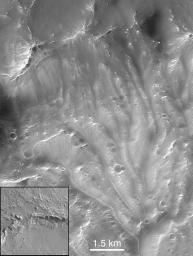
|
Channels on Bakhuysen Crater Wall
- Click the image above for a larger view
- Full-Res JPEG (1424 x 1894) (518.9 kB)
- Full-Res TIFF (1424 x 1894) (2.8 MB)
Caption:
Portion of channels on the wall of Bakhuysen crater (MOC 10605). These channels (22.1°S, 344.9°W) are the best examples of integrated drainage reminiscent of terrestrial systems. The pattern is topographically controlled; the relationships emphasized by light-colored sediments viewed in this low incidence angle (11.2°), nadir viewing (emission angle = 1.5°) image. The crater rim is marked by the escarpment running diagonally in the middle left to upper right of the image (downtrack scale = 8.4 m/pixel, crosstrack = 5.8 m/pixel). No channels outside the crater rim. This suggests that the source of the fluid was confined within the crater.
Background Info:
Malin Space Science Systems and the California Institute of Technology built the MOC using spare hardware from the Mars Observer mission. MSSS operates the camera from its facilities in San Diego, CA. The Jet Propulsion Laboratory's Mars Surveyor Operations Project operates the Mars Global Surveyor spacecraft with its industrial partner, Lockheed Martin Astronautics, from facilities in Pasadena, CA and Denver, CO.
Cataloging Keywords:
| Name | Value | Additional Values |
|---|---|---|
| Target | Mars | |
| System | ||
| Target Type | Planet | |
| Mission | Mars Global Surveyor (MGS) | |
| Instrument Host | Mars Global Surveyor | |
| Host Type | Orbiter | |
| Instrument | Mars Orbiter Camera (MOC) | |
| Detector | ||
| Extra Keywords | Crater, Dust, Grayscale | |
| Acquisition Date | ||
| Release Date | 1999-02-19 | |
| Date in Caption | ||
| Image Credit | NASA/JPL/Malin Space Science Systems | |
| Source | photojournal.jpl.nasa.gov/catalog/PIA01506 | |
| Identifier | PIA01506 | |
